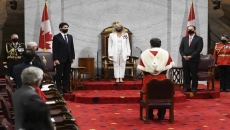The pace of Canada's economic rebound from the COVID-19 pandemic slowed in July, and maybe even more in August, Statistics Canada says, suggesting the country is in what experts described as a long, choppy path to recovery.
Statistics Canada says real gross domestic product grew by three per cent in July, matching the agency's preliminary estimate and economists' expectations, but below the 6.5 per cent recorded in June, and May's 4.8 per cent bump.
Gains have been linked to the loosening of restrictions that forced non-essential businesses to close in March and April, but they haven't been enough to haul the economy back to pre-pandemic levels.
Overall, Statistics Canada said the economy in July was about six per cent below its pre-pandemic level in February, even if some sectors like retail and real estate have recouped their losses and then some.
Looking at August, the statistics agency said growth likely continued albeit at a slower pace as it provided a preliminary estimate of a one per cent climb in GDP for the month.
"That's suggesting the steam in the recovery is going away and so, this for me is suggesting that we might be moving from a quick rebound phase of the recovery to a more challenging phase," said TD senior economist Sri Thanabalasingam.
The August figure will be finalized late next month.
The path of the recovery over the coming months will be tied to the path the pandemic takes, which could lead to rollbacks of reopening measures.
Rising case counts have prompted such calls as the country heads into what several public health officials say is a second wave of the novel coronavirus pandemic.
The increase in COVID-19 infections, coupled with the August figure suggests the sharp rebound in the third quarter won't carry over to the final three months of the year, said CIBC chief economist Avery Shenfeld.
"Easing up on COVID-19 restraints fed into solid Canadian GDP gains in July and August, but the concerns now are whether we will pay for some of that greater openness," Shenfeld wrote in a note.
The Conference Board of Canada said health measures and testing should prevent another full shutdown of economic activity earlier this year, but warned of localized lockdowns as one hurdle.
The pandemic is going to flatten the recovery curve for the next year at least, said Pedro Antunes, the organization's chief economist.
"We're going to be creating fewer jobs on a monthly basis going forward, we're going to see the increases in economic activity or GDP being much more subdued in terms of their increases overall," he said.
The Conference Board's outlook expected the unemployment rate won't fall back to its pre-pandemic levels until 2025.
Thanabalasingam said it could be early 2022 before before the economy gets back to where it was prior to COVID-19.
July's GDP report from Statistics Canada noted that all 20 industrial sectors it tracks posted increases in July, with agriculture, utilities, finance, insurance and real estate sectors recouping losses suffered since the start the pandemic.
Manufacturing grew 5.9 per cent in July, following a 15.1 per cent expansion in June as more operations ramped up production, but still remained about six per cent below where it was pre-pandemic.
The hard-hit accommodations and food services sector posted a third consecutive month of double-digit increases, jumping 20.1 per cent in July.
Thanabalasingam said despite the bump, the amount of activity in the industry was about two-thirds of where it was in February, as more people went shopping and case numbers dropped.
"There's still a very, very long way to go, even though they're posting these strong growth rates," he said.
"My worry is that as caseloads continue to rise and some of these provinces think about rolling back some of those reopening measures . . . then is this as good as it could get for these sectors?"
The health care and social assistance sector rose by 3.7 per cent in July, as more doctors, dentists and diagnostic laboratories reopened in line with the rollback of restrictions.

.jpg)




